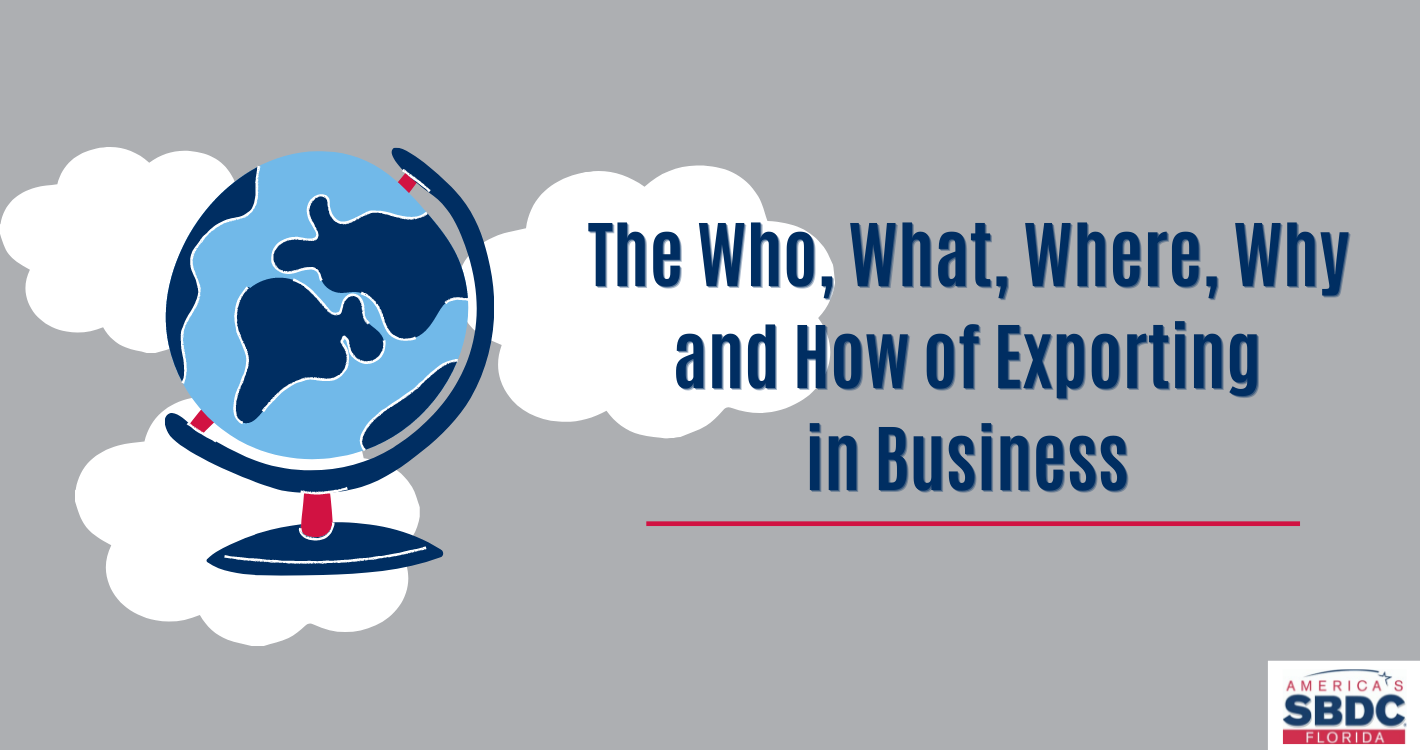Part 4: The Who, What, Where, Why and How of Exporting in Business Why Export?
by Selma Canas, CGBP | December 22, 2021
In this four-part series, we’ve covered the who, what, and where of exporting and I think we can all agree that export readiness does not happen overnight. Export readiness takes commitment, time, money and a lot of education. So, “Why Export?”
There are many reasons for a company to pursue exports. Companies that export grow faster, are more profitable and fail less than companies that do not export. Considering that 95 percent of consumers live outside of the U.S., companies who export have a greater potential for sales than those that do not.
Exporting can reduce a company’s dependence on the U.S. market. If the U.S. economy is down, you have other markets to sustain you. Exporting can extend a product’s life cycle. For example, technology becomes obsolete very quickly in the U.S. but maybe not in emerging markets. U.S. products have a competitive advantage because of their high quality.
Exporting may seem overwhelming but it is not impossible. According to the U.S. Small Business Administration (SBA), small businesses account for 97 percent of all U.S. exporters. With all the available resources to guide companies on how to export, new exporters do not need to go it alone.
Once the company has decided to purse exports and has identified a few target countries, management needs to decide on the market entry strategy. Strategies will differ depending on the product or service, the country, and the risk a company is willing to take.
A company may want to hire a sales agent in the target country and pay a commission, they may want to sell to a distributor and let them sell to their network of buyers, or may want to sell direct to their buyers. The U.S. Commercial Service is a great resource for determining the best market entry strategy. They produce country commercial guides with country specific information on how to do business, best entry strategy, top industries, trade finance, e-commerce, and so much more. These guides are an invaluable resource to learning how to sell U.S. products and services in a specific country.
Participating in tradeshows and trade missions play an important role in meeting the people you want to do business with in those target countries. At this time, the company needs to be ready to make sales. Marketing materials and digital presentations need to be translated to that country’s language. Pricing schedule should include import tariffs, value-added taxes, and shipping and import fees, even if these costs will be paid by the buyer, as the final price may be significantly higher than a local competitor.
Freight forwarders are an exporter’s best friend. The freight forwarder handles logistics and documentation for the exporter. Their services include preparing export documents, transporting goods to and from ports, determining import duties and taxes, performing due diligence, and much more. Freight forwarders can handle one or all of these services, depending on the needs of the exporter. It is a good idea to obtain quotes from several forwarders and learn about their services before choosing one.
It is important to seek the advice of your international attorney, banker and accountant before signing any contracts with buyers or distributors. You’ll want to discuss payment options, credit insurance, exclusivity, dispute resolutions, exit clauses, exchange fluctuations, taxes, etc.
New exporters should definitely take advantage of the many resources available to assist in the export process. The demand is there, the help is there, and the money is there. So, what are you waiting for… go global!







Selma Canas
Canas, Consultants, International Consultants 2, TampaNASBITE Certified Global Business Professional (CGBP), Florida SBDC at USF, Tamp
Specialties: International Trade, Export Marketing Plans, Market Research
Selma Canas is responsible for guiding small businesses through the complexities of developing export marketing and international expansion plans and teaching seminars on basic international trade. She has developed more than 30 Export Marketing Plans during the past six years for local businesses, and participated in trade missions to Brazil, Chile, Canada, and the Dominican Republic. Canas has more than 15 years of experience in sales, marketing and customer service in a variety of industries, including freight forwarding, real estate and advertising. As a co-owner of Restaurant Guide USA, she increased sales and distribution points and tripled the size of the distributed product.
As a real estate broker-owner, Canas carved a niche in the Latin American community and had a career sales volume of more than $37 million. Canas earned her bachelor degree in economics from the University of South Florida. She is a NASBITE Certified Global Business Professional and holds an Export and Trade Counseling Certification from the U.S. Small Business Association. Selma earned Florida SBDC at USF Employee of the Year honors in 2016. She is a member of Toastmasters international and is fluent in Spanish and Portuguese.